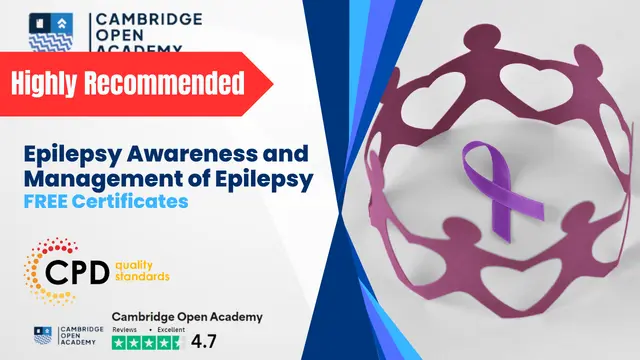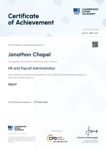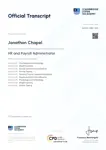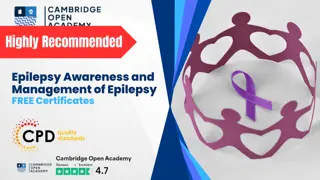
Epilepsy Awareness and Management of Epilepsy
CPD Accredited | Interactive Learning Materials | PDF Certificate Included | Tutor Support
Cambridge Open Academy
Summary
- Certificate of Completion (PDF) - Free
- Certificate of Completion (Hard Copy) - £9.99
- Exam(s) / assessment(s) is included in price
- Tutor is available to students
Add to basket or enquire
Overview
Attention all healthcare professionals! Gain valuable insights into epilepsy awareness and management with our comprehensive course. Learn about the causes, diagnosis, and treatment of epilepsy, as well as its pharmacological management and associated risk management and support needs.
Learning outcomes:
- Understand the fundamentals of epilepsy, including its causes and how it affects the body
- Identify the different types of seizures and their treatment options
- Learn about the diagnostic process for epilepsy and the various tests and procedures involved
- Develop strategies for managing epilepsy, including lifestyle changes and behavioural modifications
- Explore the different medications used to treat epilepsy and their potential side effects
- Understand the risk management and support needs of patients with epilepsy
CPD
Course media
Description
Epilepsy Awareness and Management course, designed to deepen your knowledge of this intriguing neurological condition. Throughout this comprehensive program, you'll embark on a journey of discovery, uncovering the complexities of epilepsy and gaining valuable insights into its various aspects.
The course begins with an introduction to epilepsy, shedding light on its prevalence and impact on individuals and society. You'll then explore the diverse causes of epilepsy, including genetic factors, brain injuries, and infections. By delving into the different types of seizures and their manifestations, you'll develop a nuanced understanding of the condition.
Understanding how to diagnose epilepsy is crucial, and our course provides you with the necessary knowledge to recognise and differentiate seizures from other conditions. We'll delve into the treatment options available, including medication, surgery, and alternative therapies, and discuss their benefits and potential side effects.
In addition to medical interventions, managing epilepsy requires a holistic approach. We'll examine the role of behavioural changes and their impact on seizures, helping you develop strategies to mitigate triggers and improve overall well-being. You'll also gain insights into risk management and support needs, empowering you to provide effective care and advocacy for individuals with epilepsy.
Curriculum Breakdown:
- Module 01: Introduction to Epilepsy
- Module 02: Causes of Epilepsy
- Module 03: What Is Seizure?
- Module 04: Treatment of Seizures
- Module 05: Diagnosis of Epilepsy
- Module 06: Management of Epilepsy
- Module 07: Pharmacological Management of Epilepsy
- Module 08: How Behavioural Changes Affect Epilepsy?
- Module 09: Risk management and Support Needs
Who is this course for?
The target audience for the course is:
- Healthcare professionals seeking to enhance their knowledge of epilepsy.
- Individuals caring for or supporting individuals with epilepsy.
- Students pursuing studies in healthcare or related fields.
- Educators looking to expand their understanding of epilepsy and support students with it.
- Individuals interested in learning about epilepsy for personal or professional reasons.
Requirements
- No prior knowledge needed
- Compatible with any internet-enabled device, including computers, tablets, and smartphones.
- Consistent learning experience
- Accessible anywhere, anytime
- No limitations on access
- Use Wi-Fi or mobile data
Career path
Some career paths related to this industry in the UK are:
- Epilepsy Support Worker: £18,000 - £24,000 per year
- Healthcare Assistant: £17,000 - £22,000 per year
- Community Nurse: £24,000 - £35,000 per year
- Social Worker: £25,000 - £40,000 per year
- Special Education Teacher: £25,000 - £40,000 per year
- Research Scientist (Neurology): £30,000 - £50,000 per year
Questions and answers
Currently there are no Q&As for this course. Be the first to ask a question.
Certificates
Certificate of Completion (PDF)
Digital certificate - Included
Certificate of Completion (Hard Copy)
Hard copy certificate - £9.99
Note: Delivery of hardcopy certificate is free within the United Kingdom. However, to obtain a hardcopy certificate, international students have to pay £19.99 for the shipment to their designated address.
Reviews
Currently there are no reviews for this course. Be the first to leave a review.
Legal information
This course is advertised on reed.co.uk by the Course Provider, whose terms and conditions apply. Purchases are made directly from the Course Provider, and as such, content and materials are supplied by the Course Provider directly. Reed is acting as agent and not reseller in relation to this course. Reed's only responsibility is to facilitate your payment for the course. It is your responsibility to review and agree to the Course Provider's terms and conditions and satisfy yourself as to the suitability of the course you intend to purchase. Reed will not have any responsibility for the content of the course and/or associated materials.







